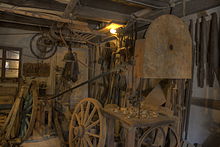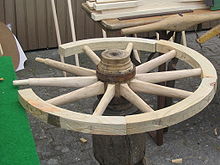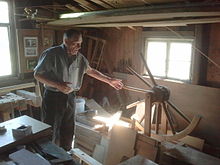Wheelwright
![]()
Stellmacher is a redirect to this article. Further meanings are listed under Stellmacher (Begriffsklärung).
The wheelwright's (also wainwright's) workshop is the workshop of a craftsman called a wheelwright, who makes wheels, wagons and other agricultural implements from wood. The name of the profession varies regionally, with Stellmacher being used more in the north, while Wagner is used in the south and in Switzerland. In addition, there are also names in the dialects that go back to Radmacher (Low German: Radmaker), Rädermacher, Achsenmacher or Axmacher. These were originally different professions; the wheelwright made the frame, the wheelmaker the wheels. Today, however, they all predominantly refer to the same activity. In coachbuilding, the wainwright was responsible for the bodywork, while the wheelwright made the wheels, the manufacture of which alone required comparable effort and expertise to that of the bodies.
With the advent of the railways in the late 19th century, the skills of wheelwrights were in demand as wagon builders. Their skills were later also needed in the bodywork of car manufacturers. Since the introduction of industrial assembly line production, the importance of wheelwrighting has declined.
After whole rows of houses burned down in many villages, strict regulations were issued in the 18th century under Count Palatine Charles IV to prevent fires, which also regulated the removal of shavings from the wainwrights' workshops every evening.
Today, the wheelwright is one of the dying professions, but still leads a niche existence in certain craft-oriented businesses. Particularly in the rural environment, the wheelwright was still a common profession in the GDR until the fall of the Berlin Wall. Especially in agricultural production cooperatives and state-owned enterprises, the wheelwright was responsible for all kinds of woodworking tasks, e.g. the manufacture of large wooden gates, equipment or wooden superstructures for custom-made special machines, but also carousels or traditional wooden carts for rural festivities.
In the museum wheelwright's workshop Langenrehm the traditional wheelwright's craft is preserved in the museum enterprise: The workshop has been preserved in its original 1930 condition, all machines are fully functional. On opening days, the wheelwright demonstrates the craft and makes wheels, wagons and carts out of wood in front of visitors. The exhibition in the residential house shows the family life on the wheelwright's farm around 1930.

Wheelwright's workshop

Emerging wooden wheel

Master wheelwright building a wagon wheel
Questions and Answers
Q: Who is a wheelwright?
A: A wheelwright is someone who builds or repairs wheels.
Q: What were wheels made of in the olden days?
A: Wheels were made of wood in the olden days.
Q: Why did the cartwright and wheelwright have different jobs?
A: The cartwright made the cart and the wheelwright did the specialized job of making the wheels because it was a difficult job to make them.
Q: What were some wheels made of in ancient times?
A: Some wheels were made of bone in order to look beautiful in ancient times.
Q: Is the word wheelwright often used to refer to people who make wheels today?
A: No, the word wheelwright is not often used for people who make wheels today.
Q: Where are wheels made today?
A: Wheels are made in factories today.
Q: Do lots of people work on making wheels in factories?
A: Yes, lots of people on the production line each have their bit to do when making wheels in factories.
Search within the encyclopedia